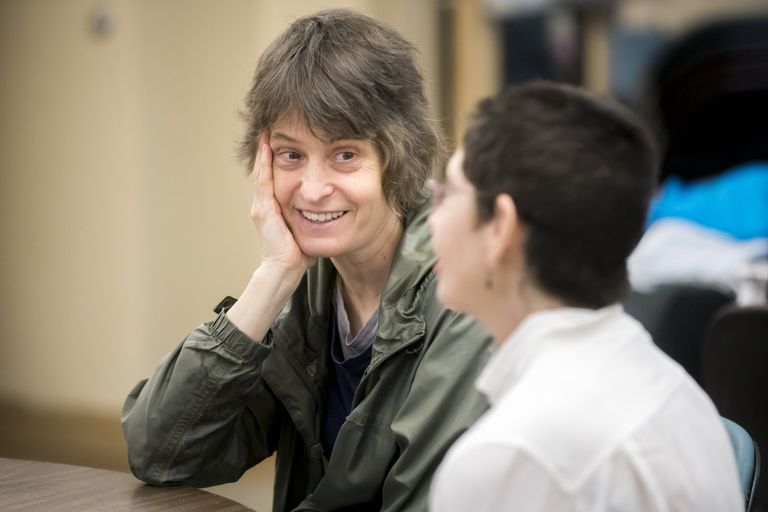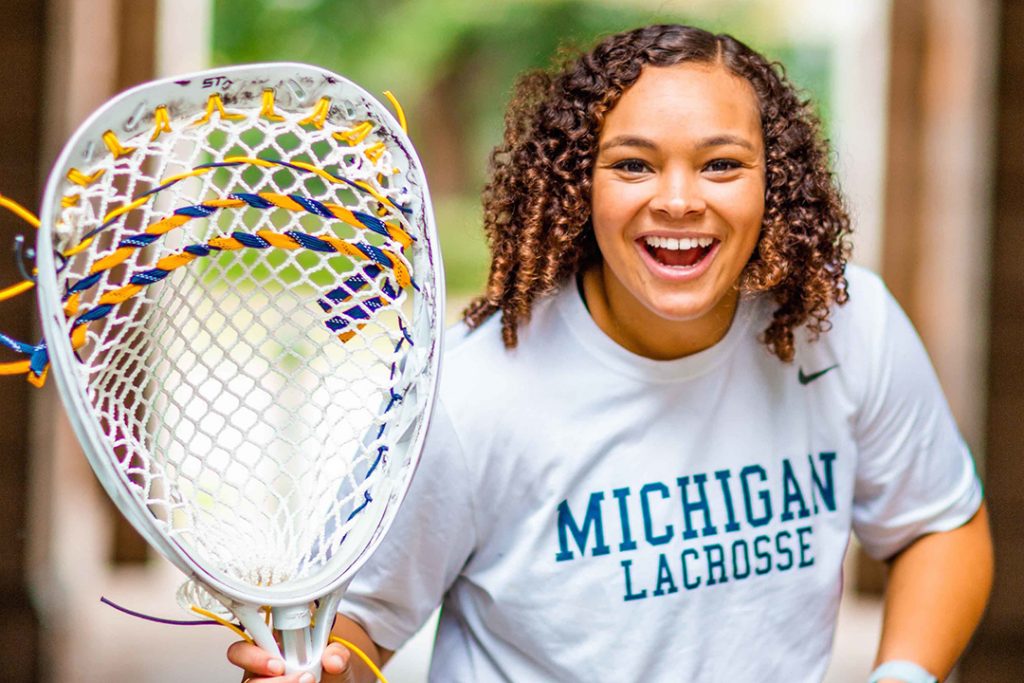This article is in support of Athletes Connected’s new Life After Sports initiative to support student-athletes when their athletic careers conclude. The University of Michigan is committed to supporting former student-athletes by providing resources to finding a provider and understanding insurance.
 By Emily Klueh, LLMSW, Athletes Connected Program Coordinator and U-M Athletic Counselor
By Emily Klueh, LLMSW, Athletes Connected Program Coordinator and U-M Athletic Counselor
Imagine this scenario:
You’re a senior and today is the last day of NCAA competition. You’re excited, but apprehensive, and the rush of emotions has hit you like a ton of bricks. You feel a twinge in your stomach knowing your career is coming to an end and this is the last time you will be competing with your team. Thoughts flood your mind: what am I going to do with all my time now? All I know is swimming. Who will I be without it? I am not ready to leave the team.
And just like that it is over.
Personally, I was fortunate to compete in high school, college, and professionally for six years after graduation. I had a different path than many because I was able to travel the world and represent my country longer than expected. I was a swimmer, it was my life, my form of income, who I was at my core.
Competing for so long afforded me the opportunity to put effort into finding another passion and knowing what I wanted to do after I retired. I was able to grow in and through my sport which ultimately set me up to be successful when I knew it was time to retire. I thought retirement from sport was going to be easy. I was ready to step away; a choice many athletes do not have the opportunity to take. However, my retirement did not come without its struggles, and that surprised me.
It wasn’t challenging in the sense that I wanted to come back to sport or felt lost; instead, it was challenging to understand who I was away from my sport and how to use what sport taught me in the real world.
One of the struggles that I felt hit me hardest was learning new boundaries and goals. Understanding the difference between what those meant while competing and what they meant in the workforce and life away from my sport was hard.
Much of my identity was often wrapped up in my performance and who I was as a swimmer. I knew what I was good at and it was ingrained in who I felt I was. Outside of sport, that identity shift was hard.
Identities affect the way we carry ourselves through day-to-day interactions. Sport is something you do; it does not define who you are. The traits and qualities you possess make up who you are as an individual. Visit the new Life After Sport section to learn more.
I was constantly feeling as though I needed to push, do more, and show others what I was capable of, because that is what I did as a competitive athlete. Nevertheless, in the work force and life outside of sport, there are no discernible achievements like there are in sport, such as winning a Big Ten title. Winning a title or achieving a time goal is concrete — you do it or you don’t — then you reset and work again.
I found that I struggled to set boundaries and take care of myself, because nothing ever felt good enough. I was constantly looking for approval, something to measure success, and looking for it to feel similar to what I knew in sport. It isn’t the same. I had to learn that.
I’ve stumbled and took some time to find my way, but I’ve managed to keep moving. I love my job and I love what I do, but I still feel as though I am finding myself outside of my sport. I am still working to discover a healthy balance and what brings me happiness as it is different now than it was when I was an athlete. My experience with sport was an amazing ride. It was hard and brutally honest at times, but there isn’t anything I would change from my time as an athlete as every experience set me up to be successful in my life now after sport.
No matter when or why you are retiring, there may be some transition time and you will have the opportunity (and difficulty) to figure out what areas of your identity will come to the forefront.
 Identities affect the way we carry ourselves through day-to-day interactions. Sport is something you do; it does not define who you are. The traits and qualities you possess make up who you are as an individual.
Identities affect the way we carry ourselves through day-to-day interactions. Sport is something you do; it does not define who you are. The traits and qualities you possess make up who you are as an individual.
Athletic identity is tricky because it affects each person in a psychological, social, and behavioral way. A few common examples include: psychologically learning to handle the ups and downs of success and pushing past the point of pain; socially learning how to be a positive teammate; and behaviorally making choices in relation to your lifestyle like eating and sleeping habits to enhance your performance. These three things all work together and inform the decision making process of an athlete.
When you retire from your sport, these will still play a part in your identity, but in a different way. As an athlete your thoughts and decisions are often driven by the fact that you are a student-athlete. When this comes to an end how do you adapt to this change?
There are two ways athletes transition from their sport. The first is through free choice, and the other is through uncontrolled circumstances.
Those who are forced to retire due to injury or other reasons may sometimes find the transition more difficult than those who choose to leave the sport on their own terms. Nonetheless, whether the retirement was planned or unplanned, the emotions tied with identity loss can creep in.
Research suggests that individuals who have a high athletic identity tend to struggle more with adaptation away from their sport once retirement is announced. For some, especially those whose retirement was unplanned and out of their control, it is common to experience the emotions of grief or loss. It can feel like losing someone or something they love. These athletes can experience the five stages of grief and loss, which are denial, anger, bargaining, depression, and acceptance. Many athletes go through the stages differently, and some may not even go through all of them.
Experiences vary from person to person, but it is helpful to recognize these emotions and understand what is happening in order to positively cope with the transition. Recognizing that these emotions are okay and normal to experience can make them more manageable. Whether you are planning your retirement or not, it is important to have a support system and coping strategies in place. A support system can mean different things to each person.
-
Here are some ways to identify and build a support system:
- Having strong connection with friends and family to talk about future plans and goals
- Meeting people outside sport
- Getting involved with other groups and clubs on campus or at your school
- Scheduling appointments with a counselor to have a safe place to talk through the emotions felt
- Coping strategies can include:
- Remembering that your sport does not define who you are as a person
- Allowing yourself to go through the emotions you are feeling. Suppressing your thoughts can make them feel stronger. Give yourself the time to experience the emotions. Remember they will shift with time.
- Setting new goals, this can be either in school or with a new group
- Understanding and working with someone to better identify that you are more than an athlete
As always, reach out when you are struggling. There are support systems in place to provide resources and strategies to help you cope with the transition, whether you are ready to retire or not.
At some point every athlete, no matter if you are an Olympian, playing your last college game, or ending sport after high school, has to learn how to transition out of their athletic identity. You are not alone.
About the Author:
Emily Klueh is a clinical athletic counselor for the U-M athletic department’s Performance Psychology Center. She provides direct clinical care to student-athletes, consults with coaches, conducts team presentations, creates educational programming and works interactively with support staff.
A native of Kentucky, Klueh was an elite swimmer, winning an NCAA championship, being named Big Ten Swimmer of the Year and competing professionally until 2016, while also representing USA Swimming. She earned her bachelor’s and master’s degrees from the University of Michigan. For Athletes Connected, Emily is a program coordinator.





 By Rachel Amity, MSW Candidate, U-M Athletic Counseling Team
By Rachel Amity, MSW Candidate, U-M Athletic Counseling Team


 ANN ARBOR, Mich. – The University of Michigan’s Athletes Connected program
ANN ARBOR, Mich. – The University of Michigan’s Athletes Connected program